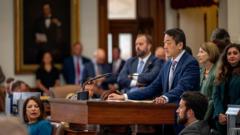The U.S. House of Representatives is currently in a heated session for the final vote on President Trump's ambitious domestic policy bill, which seeks to fundamentally alter various welfare and tax programs. Speaker Mike Johnson has managed to unify Republican members enough to bring the bill to the floor after overcoming a significant revolt from conservative factions within his party.
Speaker Johnson briefly addressed the House before the vote, emphasizing the bill's intent to enhance safety and prosperity across America. However, his party had to endure considerable disruptions before reaching this point. The process culminated in a record-breaking speech by Representative Hakeem Jeffries that extended over eight hours, aimed at delaying the legislation and criticizing its implications for vulnerable Americans.
This contentious bill, which proposes slashing taxes by $4.5 trillion while simultaneously reducing federal healthcare programs, has drawn fierce opposition from Democrats. They have cited the potential dangers of cutting roughly $1 trillion from Medicaid and limiting food assistance programs. In the Democratic camp, leaders like Jeffries argue the legislation embodies a "disgusting abomination" that prioritizes the wealthy at the expense of working-class families.
Key Republicans initially hesitated to support the bill, voicing concerns about its financial implications. Some have expressed worries that the definition of fiscal conservatism within their party might be hindered by the legislation. In light of Trump's direct appeal and pressure on GOP members, a few defectors have shifted their stance to favor the bill.
Democrats have leveraged this dissent by publicly challenging specific Republican colleagues, particularly those with key constituency ties to Medicaid. Moving forward, they assert that linking support for this bill to electoral consequences will be crucial during the upcoming midterm elections, as more than half of surveyed voters express fears about its negative impact on their families.
As of now, Republican leadership is cautious but hopeful; Johnson is counting on the tight majority while Democrats prepare to amplify their attacks on the policy's fallout post-approval, which they anticipate will serve as a centerpiece of their campaign narratives during the critical election year ahead.




















